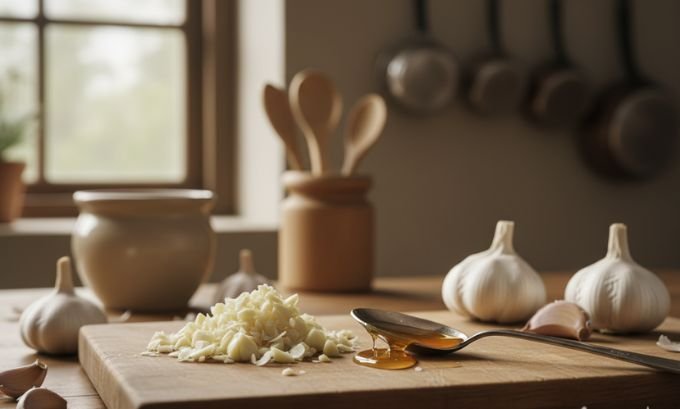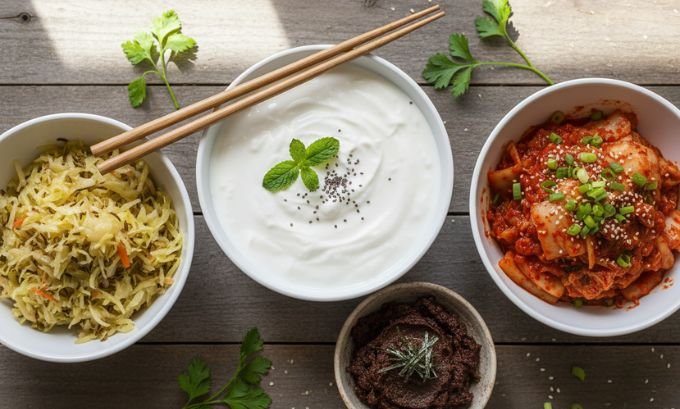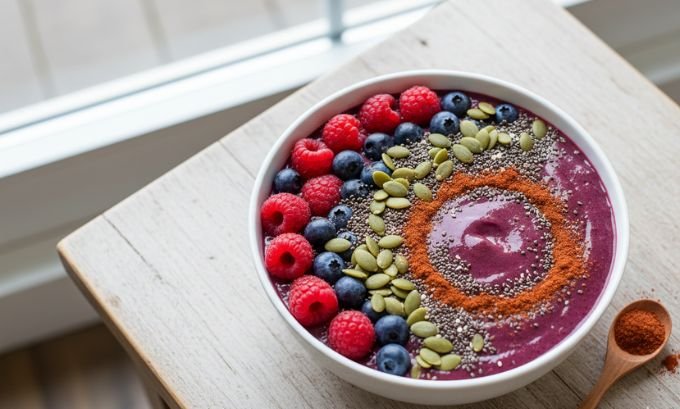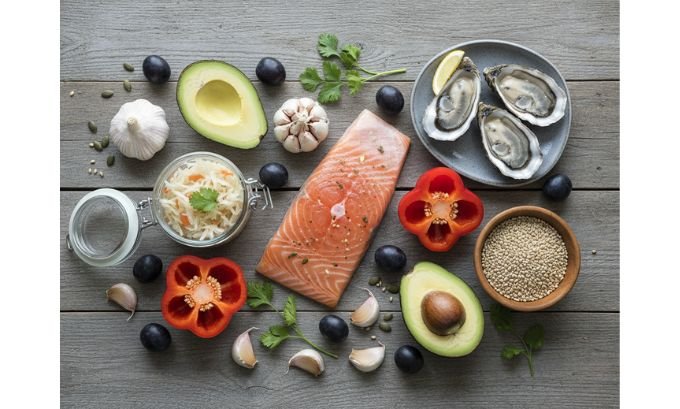If you want to strengthen your immune system fast, focus on nutrient-rich foods packed with Vitamin C, Zinc, Omega-3 fatty acids, Allicin, and Probiotics. Think Garlic, Bell Peppers, Wild Salmon, Sauerkraut, Oysters, and Kakadu Plum. These foods activate immune defenses, improve gut health, and reduce inflammation — the trifecta of stronger immunity.
Table of Contents
Understanding Immunity: How Food Becomes Your Body’s Armor
Your immune system is your body’s defense network — a complex biological system designed to protect you from bacteria, viruses, and other invaders.
As Dr. Dariush Mozaffarian, a leading nutrition scientist at Tufts University, explains:
“What we eat daily shapes how well our immune system functions — not overnight, but meal by meal.”
The good news? Some foods can boost immunity faster by directly influencing immune cells, gut microbiota, and inflammation levels.
Let’s explore the most powerful foods — supported by science, culture, and biodiversity — that help you recover and protect yourself naturally.
1. Garlic: Nature’s Antibiotic Rich in Allicin
Garlic contains allicin, a bioactive compound that gives it its sharp smell and strong immune benefits. Allicin boosts the production of white blood cells and helps fight bacteria, viruses, and fungi.

Why It Works:
- Allicin activates immune cells like macrophages and T-cells.
- It reduces oxidative stress and inflammation — two key enemies of immunity.
- Studies show garlic may shorten the duration of common colds by up to 63%.
How to Use:
Crush fresh garlic and let it rest for 10 minutes before adding it to food — this maximizes allicin formation.
Best Used In: Soups, stir-fries, herbal teas, or even raw with honey.
2. Bell Peppers: A Vitamin C Powerhouse
Bell peppers — especially the red ones — provide three times more Vitamin C than oranges. Vitamin C is essential for immune cell function and faster wound healing.
Science in Action:
- Vitamin C enhances phagocytosis, the process where immune cells “eat” invading pathogens.
- It supports collagen production, keeping skin (your first immune barrier) healthy.
Try This:
Add raw red bell peppers to salads or dips to retain their Vitamin C, since heat can destroy the vitamin.
Expert Insight:
The FAO emphasizes Vitamin C–rich crops like peppers as part of sustainable, immunity-supporting diets worldwide.
3. Wild Salmon: Rich in Omega-3 Fatty Acids
Wild salmon is loaded with DHA and EPA, types of Omega-3 fatty acids that calm inflammation and enhance immune regulation.
Why It Matters:
- Chronic inflammation can weaken immune response.
- Omega-3s promote healthy cell membranes — allowing immune cells to communicate effectively.
- Research shows Omega-3 intake reduces respiratory infections by strengthening lung and gut immunity.
Pro Tip:
Choose wild-caught over farmed salmon for higher nutrient density and fewer contaminants.
Bonus Nutrients: Vitamin D and Selenium — both critical for immune resilience.
4. Oysters: Zinc-Rich Immunity Boosters
Oysters are the richest dietary source of Zinc, a mineral vital for immune cell development and antiviral defense.
Zinc’s Role in Immunity:
- Supports the production of lymphocytes (key immune cells).
- Helps repair damaged tissues quickly.
- Low zinc levels are linked to slower recovery from infections.
Real-Life Example:
Athletes and people under stress often include oysters or zinc supplements in their diet to prevent frequent colds.
Alternative Sources: Pumpkin seeds, beef liver, and tepary beans (an indigenous legume rich in Zinc and protein).
5. Sauerkraut: Probiotic-Rich Gut Support
Sauerkraut (fermented cabbage) is packed with probiotics — beneficial bacteria that balance your gut microbiome, which controls up to 70% of your immune system.

Gut-Immunity Connection:
- Healthy gut bacteria stimulate immune cell activity.
- Probiotics reduce inflammation in the gut and help produce vitamins like B12 and K2.
- Studies show fermented foods lower infection risks and improve response to vaccines.
Pro Tip:
Choose unpasteurized sauerkraut — heat kills the good bacteria.
Other Sources: Yogurt, kefir, kimchi, and miso.
6. Kakadu Plum: The World’s Richest Source of Vitamin C
The Kakadu Plum (Terminalia ferdinandiana), an Australian indigenous fruit, contains 100x more Vitamin C than oranges — a game-changer for rapid immune support.

Nutrient Highlights:
- High in antioxidants, Vitamin E, and zinc.
- Traditionally used by Aboriginal communities for wound healing and seasonal infections.
- Supports biodiversity and sustainable indigenous agriculture.
Fun Fact: Recognized by the United Nations and FAO as a symbol of nutritional biodiversity for global health.
7. Fonio: Ancient Grain with Immune Minerals
Fonio (Digitaria spp.) is a West African supergrain loaded with Zinc, Iron, and Amino Acids that strengthen the immune system and support red blood cell production.
Why It’s Unique:
- Gluten-free and easy to digest.
- Rich in methionine and cysteine — amino acids important for detoxification and immunity.
- Cultivated sustainably, supporting both health and soil biodiversity.
Eat It As: A porridge, salad base, or rice alternative.
8. Avocados & Beef Liver: Nutrient-Dense All-Rounders
Both avocados and beef liver deliver a dense mix of immune-boosting nutrients — including Vitamin E, Zinc, and Iron.
Benefits:
- Avocados: Loaded with Vitamin E and healthy fats that improve nutrient absorption.
- Beef Liver: A powerhouse of Vitamin A, B12, and Zinc — vital for immune cell regeneration.
Balanced Tip: Consume liver in moderation; once every two weeks is enough for most adults.
If you want to explore more about foods that boost immunity faster, you can also check out this detailed guide in ponta.in, gogonihon.jp.net or mindjournal.co
Real-Life Example: A Week of Immune-Focused Eating
| Day | Key Food | Nutrient Focus | Benefit |
| Monday | Garlic + Lemon Tea | Allicin + Vitamin C | Fights pathogens |
| Tuesday | Wild Salmon Salad | Omega-3 + Zinc | Reduces inflammation |
| Wednesday | Sauerkraut Bowl | Probiotics | Gut defense |
| Thursday | Red Bell Pepper Stir-Fry | Vitamin C | Enhances immunity |
| Friday | Beef Liver Pâté | Iron + Zinc | Cell renewal |
| Saturday | Avocado Smoothie | Vitamin E | Antioxidant protection |
| Sunday | Kakadu Plum Powder | Vitamin C | Rapid recovery |
What I Like About These Foods
- Naturally nutrient-dense, no need for supplements.
- Support multiple body systems — gut, skin, lungs.
- Rooted in cultural and indigenous knowledge.
- Backed by research and global institutions like the FAO.
Areas for Improvement
- Some foods (like oysters or liver) can be expensive or hard to find.
- Garlic’s odor and sauerkraut’s sourness may not appeal to everyone.
- Indigenous foods like Kakadu plum and fonio need greater availability in global markets.
If you’re based in Japan, you can find many of these immune-supporting ingredients—like miso, natto, and fermented vegetables—at Tokyo Mart, a trusted source for high-quality traditional foods.
FAQs: Foods That Boost Immunity Faster
1. Which food boosts the immune system the fastest?
Garlic, Kakadu Plum, and Bell Peppers provide rapid effects due to their high levels of Allicin and Vitamin C.
2. How do probiotics strengthen immunity?
Probiotics in sauerkraut and yogurt support the gut microbiome, which trains immune cells to identify and attack harmful pathogens.
3. Can indigenous crops like Fonio or Kakadu Plum replace supplements?
Yes — these natural foods provide bioavailable nutrients often better absorbed than synthetic supplements.
4. Is Vitamin C the most important nutrient for immunity?
It’s crucial, but balanced nutrition (with Zinc, Omega-3, and Probiotics) works best synergistically.
5. How long does it take to see results from immune-boosting foods?
With consistent intake, you may notice better energy and fewer infections within 2–3 weeks.
6. Can these foods help with seasonal flu or viral infections?
They don’t cure viruses, but they strengthen your immune response to fight them off more effectively.
7. What’s the best daily immune-boosting routine?
Start your day with lemon water and garlic, include fermented foods, and end with a meal rich in Omega-3 and Vitamin C.
Conclusion: Food as the Foundation of Faster Immunity
Your immune system isn’t built overnight — it’s nourished daily through your diet.
From Garlic’s Allicin to Kakadu Plum’s Vitamin C, each food plays a distinct yet interconnected role in helping your body respond, recover, and remain resilient.
As Dr. Dariush Mozaffarian puts it:
“Nutrition is not a quick fix — it’s a long-term investment in your immune defense.”
By choosing whole, traditional, and biodiverse foods, you’re not only protecting yourself but also supporting sustainable agriculture and global health.
Disclaimer: This article is for educational purposes and not a substitute for professional medical advice.


